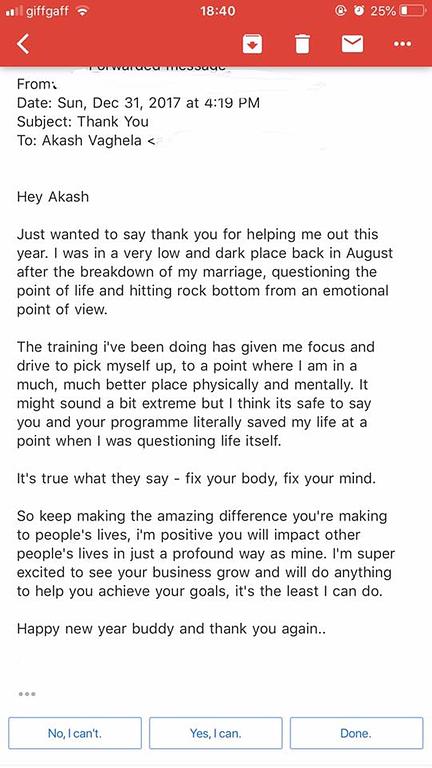The Science Behind Fitness and Depression
Other Contributing Factors
The RNT Client Experience

Shriti: “We are often told the only cure to depression is medicine, but after joining RNT this was not the case. Mental pain is less dramatic than physical pain, but it is more common and also hard to bear, the frequent attempt to conceal mental pain increases the burden.
Taking A Step In The Right Direction
You can listen to Vanita’s full story where she dives deeper into her transformation.
The Current Climate And The Future Role Of Fitness In Public Health
Resources
- Psychology Today. Nov/Dec 1999, Vol. 32 Issue 6, p24. 1/3p.
- American Fitness May/Jun 2000, Vol. 18 Issue 3, p38 4p
- Almagro Valverde, S., Duenas Guzman, M. A., Tercedor Sanchez, P. Physical Activity and Depression: A Systematic Review. Revista Internacional de Medicina y Ciencias de la Actividad Fisica y del Deporte 2014, Vol. 14 Issue 54, p363 15p.
- Glowacki, Krista., Faulkner, Guy. WellSpring, Sept 2019, Vol. 30 Issue 9, p1 5p.
- Sahin, Metin., Bademli, Kerime., Lok, Neslihan., Uzun, Gluten., Sari, Ali., Lok, Sefa. Relationship Between Psychological Activity Levels and Well-being of Individuals. Ovidius University Annals, Series Physical Education & Sport/Science, Movement & Health 2018 Supplement, Vol. 18, p337 6p.
- Stanley, Suzanne H., Ng, Sai Moy., Laugharne, Jonathan D E., The ‘Fit for Life’ exercise programme: improving the physical health of people with a mental illness. Psychology, Health & Medicine Feb 2019, Vol 24 Issue 2, p187 6p.
- Newman, Tim. Physical fitness may help prevent depression, anxiety. Medical News Today, August 11 2019: https://www.medicalnewstoday.com/articles/326005
- Collins, Ryan. Exercise, Depression, and the Brain. Healthline, July 2017: https://www.healthline.com/health/depression/exercise#Exercise-and-brain-chemistry
- Fox, K. R., 1999, The influence of physical activity on mental well-being. Public health nutrition, 2(3a), 411-418.
- De Mello, M. T., de Aquino Lemos, V., Antunes, H. K. M., Bittencourt, L., Santos-Silva, R., & Tufik, S., 2013 Relationship between physical activity and depression and anxiety symptoms: a population study. Journal of Affective Disorders, 149(1), 241-246.
- Rehn, T. A., Winett, R. A., Wisløff, U., & Rognmo, Ø, 2013, Increasing physical activity of high intensity to reduce the prevalence of chronic diseases and improve public health. The open cardiovascular medicine journal, 7, 1.
- https://www.nhs.uk/conditions/stress-anxiety-depression/exercise-for-depression/ [Accessed Oct 2020]
- https://www.who.int/news-room/fact-sheets/detail/depression [Accessed Oct 2020]

.jpg)
.png)
.png)